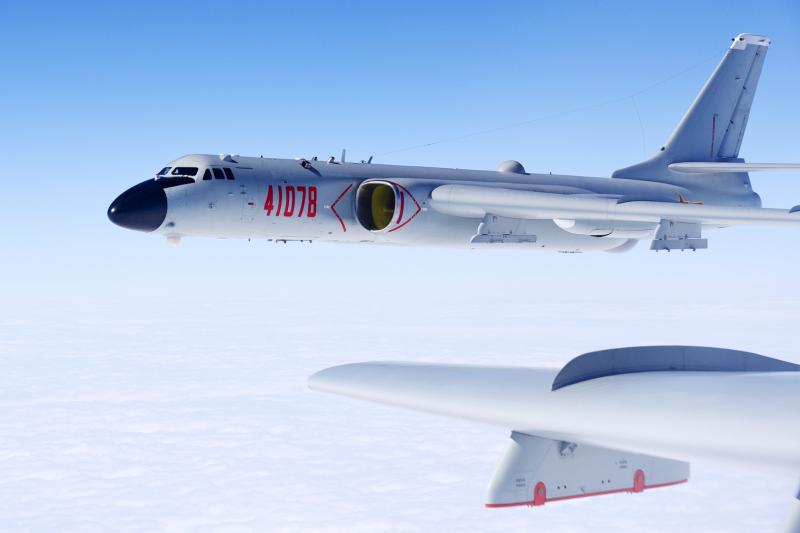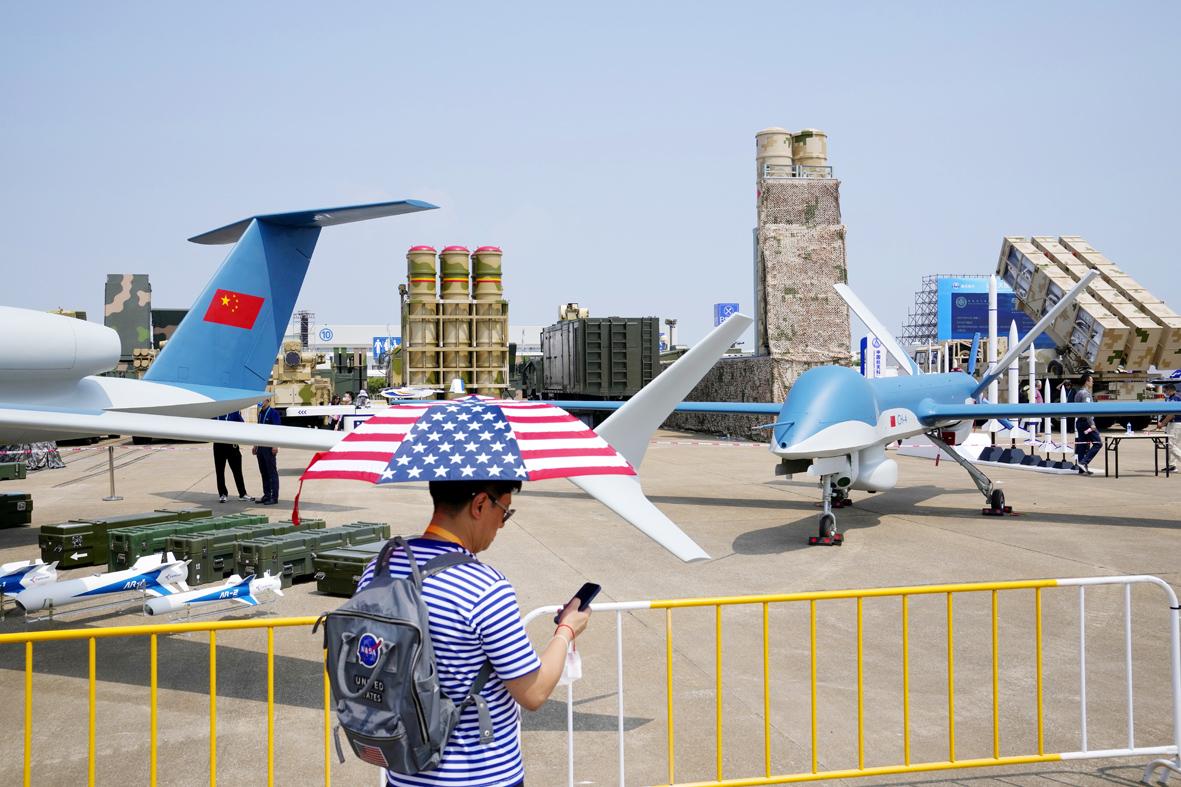One of the things I learned early on in being a lifelong atheist is that, in the US, atheism requires a sustained, rocklike stubbornness in resisting the constant flow of pressure from public, performative Christianity.
For people who hold nonconformist, evidence-driven, humanistic beliefs, being in the larger society often feels like being under that German soldier in that scene from Saving Private Ryan, stabbed to death inch by slow inch, while he whispers: “shhhh, shhhh.”
That’s what it means to be pro-Taiwan. Those of us engaged in public speech about Taiwan, its international status, the threats it faces, and what kind of place it is, often sound a mite crazed to outsiders talking about international affairs, and sometimes find ourselves apologizing for our stubbornness.

Photo: AP
Many of us also find ourselves second-guessing ourselves. Should we speak on this or that topic? If we do, publicly or privately? Maybe it’s best just to stay silent.
The way we sound is not a function of our ideas, which are humanistic, rational and democratic. It is a problem of the arena of discussion, in which those values are largely ornamental.
Last week Chinese warplanes flooded Taiwan’s Air Defense Identification Zone (ADIZ). The threat to Taiwan was clear.

Photo: AP
Though the issue was the threat to Taiwan and the political meaning(s) of the Chinese moves, a clatter arose on social media about the fake issue of nomenclature: were the planes in “Taiwan’s airspace” as some media reported?
It was obvious, after a couple of rounds of discussion of this (some pardonably good posts on the history of Taiwan’s ADIZ aside), that the function of this discussion was distraction — outright disinformation would not do, since the threat intent of the Chinese warplanes was obvious.
Hence, the need for a diversion.
One source, widely cited on Twitter, contended that “Taiwan’s airspace” could not be used, because the planes were not in “Taiwan’s sovereign airspace” (a claim that never appeared in the media). But in fact, they were in Taiwan’s Flight Information Region (FIR), an administrative region assigned to Taiwan by the International Civil Aviation Organization (ICAO), which is more or less coterminous with Taiwan’s ADIZ on the south and east side of the island.
“Taiwan’s airspace,” plausibly enough. The media has used that phrase many times over the years. Since it is not easy to package complicated ideas like ADIZs and FIRs into digestible bits for public consumption, such shorthand usages are common.
The insistence that “Taiwan’s ADIZ” be used, and the function of that discussion, was to deprecate the threat of China’s aircraft and scold Taiwan for reacting strongly — indeed some media retreated even from saying they were in Taiwan’s ADIZ, fuzzily noting that the warplanes were in international airspace near Taiwan. Readers thus lost the vital information that these flights represented something both unprecedented and out of place.
Also lost in the discussion was that the Chinese aircraft had passed very near or even over what looked like, at least on the maps presented, as the Philippines sovereign airspace. As of this writing Manila has maintained a studied public silence on these flights. The US and Taiwan were not the only nations being tested.
To speak for Taiwan, to struggle to speak out against this wave of deprecation and diversion, required an intense stubbornness. Indeed, that is what such diversions are for — when successful, they make those who point out how wrong they are seem irrational.
Speakers who wanted to appeal to this conversational hegemony were forced to pile on additional explanatory information in their presentations on the overflights, making them duller and more complicated.
It was a very effective campaign.
Even as China was flying warplanes in unprecedented numbers near Taiwan, observers safe in areas far from Taiwan continued to advocate selling it out to avoid war — as if yielding Taiwan to China will have no security consequences for Japan, the Philippines, Australia and the nations on the South China Sea, never mind the US.
The US should do this, we are told, to avoid not just war, but a new cold war. This framing pre-positions pro-Taiwan voices as churlish warmongers. In a media environment in which the term “annex” is never used to represent China’s desire to swallow Taiwan and Beijing is never represented as “expansionist,” speakers who resolutely insist on using realistic terminology to describe China’s behavior sound guttural, discordant, even barbarous.
We face a world that is always saying “shhhh, shhhh” to us as the knife slides in.
“It is time for Beijing and Washington to overcome their largely domestic political limitations, and lay out a pathway toward stability regarding Taiwan based on credible mutual assurances,” wrote Michael Swaine of the Carnegie Endowment for International Peace at Responsible Statecraft this week. Swell stuff, decent and gentlemanly.
As for Taiwan, that obstreperous red-haired stepchild of the international order, it can go sit in the corner and wait quietly while the adults decide when it will be annexed. Shhhhh, little one, while we sort out what are clearly domestic issues.
Indeed, Paul Heer’s recent review of whether there will be a new Cold War between Washington and Beijing at the National Interest doesn’t even mention Taiwan. Shhhh, you!
One wants to scream at decent gentleman like Swaine, with the fictional Lewis in The Remains of the Day: “Do you have any idea of what sort of place the world is becoming all around you? The days when you could just act out of your noble instincts, are over.”
But as is so often the case with speakers who are noble and decent and gentlemanly, Swaine’s organization, the Carnegie Endowment, has offices in China. I am sure its contracts with its Chinese hosts are safe for another year.
No, the truth is ugly and barbarous, and we need to keep stubbornly pointing it out. That blight across the Strait is the threat to peace, not Taiwan and its voices. It cannot be reasoned with, and it will not keep any assurances it makes.
The next few years will be crucial. The pressure to sell out Taiwan will only grow as Beijing becomes more powerful. Our stubborn voices have never been more needed to spoil the soothing harmonies of compromise and appeasement with discordant notes of “annexation” and “resistance.”
We speakers on Taiwan are like the thief in the famous tale of Herodotus, requesting a stay of execution for a year to teach the King’s horse to sing. Maybe, if we sing hard enough, the Party in Beijing will die. Maybe we will be freed. Or maybe, if we teach policymakers and commentators hard enough, that horse will learn to sing.
Notes from Central Taiwan is a column written by long-term resident Michael Turton, who provides incisive commentary informed by three decades of living in and writing about his adoptive country. The views expressed here are his own.

Jacques Poissant’s suffering stopped the day he asked his daughter if it would be “cowardly to ask to be helped to die.” The retired Canadian insurance adviser was 93, and “was wasting away” after a long battle with prostate cancer. “He no longer had any zest for life,” Josee Poissant said. Last year her mother made the same choice at 96 when she realized she would not be getting out of hospital. She died surrounded by her children and their partners listening to the music she loved. “She was at peace. She sang until she went to sleep.” Josee Poissant remembers it as a beautiful

Before the last section of the round-the-island railway was electrified, one old blue train still chugged back and forth between Pingtung County’s Fangliao (枋寮) and Taitung (台東) stations once a day. It was so slow, was so hot (it had no air conditioning) and covered such a short distance, that the low fare still failed to attract many riders. This relic of the past was finally retired when the South Link Line was fully electrified on Dec. 23, 2020. A wave of nostalgia surrounded the termination of the Ordinary Train service, as these train carriages had been in use for decades

Lori Sepich smoked for years and sometimes skipped taking her blood pressure medicine. But she never thought she’d have a heart attack. The possibility “just wasn’t registering with me,” said the 64-year-old from Memphis, Tennessee, who suffered two of them 13 years apart. She’s far from alone. More than 60 million women in the US live with cardiovascular disease, which includes heart disease as well as stroke, heart failure and atrial fibrillation. And despite the myth that heart attacks mostly strike men, women are vulnerable too. Overall in the US, 1 in 5 women dies of cardiovascular disease each year, 37,000 of them

Politically charged thriller One Battle After Another won six prizes, including best picture, at the British Academy Film Awards on Sunday, building momentum ahead of Hollywood’s Academy Awards next month. Blues-steeped vampire epic Sinners and gothic horror story Frankenstein won three awards each, while Shakespearean family tragedy Hamnet won two including best British film. One Battle After Another, Paul Thomas Anderson’s explosive film about a group of revolutionaries in chaotic conflict with the state, won awards for directing, adapted screenplay, cinematography and editing, as well as for Sean Penn’s supporting performance as an obsessed military officer. “This is very overwhelming and wonderful,” Anderson